Hyundai Kona vs Porsche Cayenne – Differences & prices compared
Compare performance, boot space, consumption and price in one view.
Find out now: which car is the better choice for you – Hyundai Kona or Porsche Cayenne?
The Hyundai Kona (SUV) comes with a Petrol, Full Hybrid or Electric engine and Manuel or Automatic transmission. In comparison, the Porsche Cayenne (SUV) features a Petrol or Plugin Hybrid engine with Automatic transmission.
When it comes to boot capacity, the Hyundai Kona offers 466 L, while the Porsche Cayenne provides 772 L – depending on how much space you need. If you’re looking for more power, decide whether the 218 HP of the Hyundai Kona or the 739 HP of the Porsche Cayenne suits your needs better.
In terms of consumption, the values are 14.60 kWh4.50 L per 100 km for the Hyundai Kona, and 4 L for the Porsche Cayenne.
Price-wise, the Hyundai Kona starts at 23100 £, while the Porsche Cayenne is available from 87000 £. Compare all the details and find out which model fits your lifestyle best!
Hyundai Kona
The Hyundai Kona blends a bold design with a versatile interior, making it a standout choice in the compact SUV market. Its crisp handling and responsive steering provide an engaging driving experience, whether in the city or on the open road. The vehicle also offers a range of features designed to enhance comfort and connectivity, ensuring a pleasurable journey for both driver and passengers.
details @ hyundai.news
@ hyundai.news
 @ hyundai.news
@ hyundai.news
 @ hyundai.news
@ hyundai.news
 @ hyundai.news
@ hyundai.news
Porsche Cayenne
Der Porsche Cayenne präsentiert sich als beeindruckender Vertreter der Premium-SUVs und verbindet kraftvolles Design mit luxuriösem Komfort. Sein dynamisches Fahrverhalten und die hochwertigen Materialien im Innenraum machen jede Fahrt zu einem besonderen Erlebnis. Zudem bietet der Cayenne modernste Technologiefunktionen, die sowohl Unterhaltung als auch Sicherheit gewährleisten.
details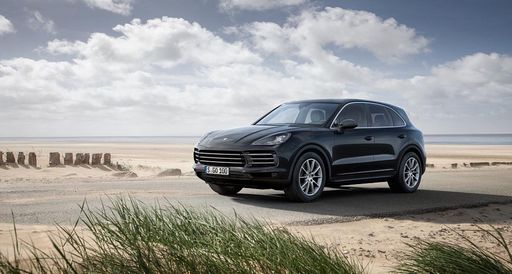 @ Porsche Media Deutschland
@ Porsche Media Deutschland
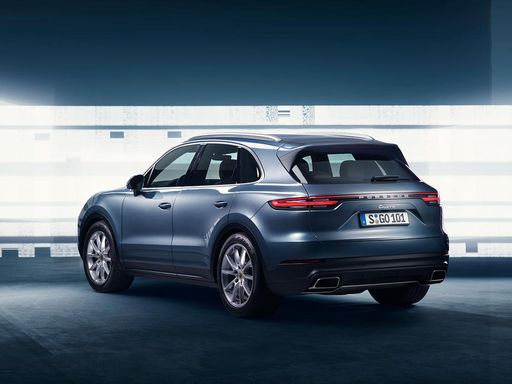 @ Porsche Media Deutschland
@ Porsche Media Deutschland
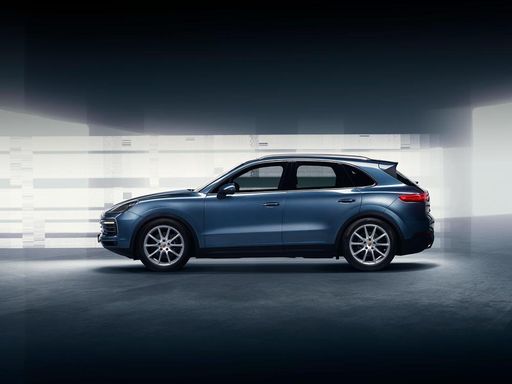 @ Porsche Media Deutschland
@ Porsche Media Deutschland
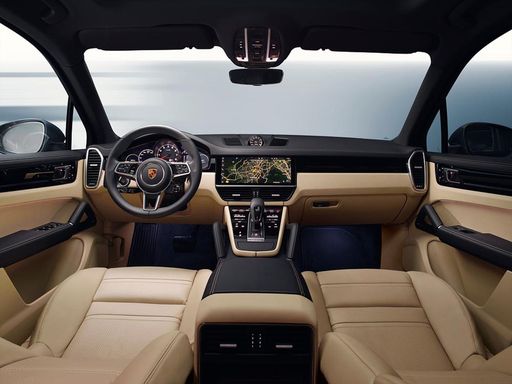 @ Porsche Media Deutschland
@ Porsche Media Deutschland
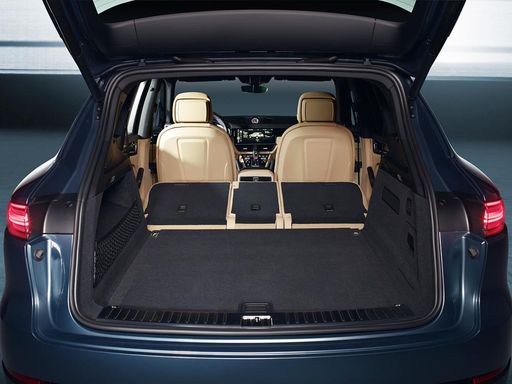 @ Porsche Media Deutschland
@ Porsche Media Deutschland

|

|
|
|
|
Costs and Consumption |
|
|---|---|
|
Price
23100 - 41600 £
|
Price
87000 - 186400 £
|
|
Consumption L/100km
4.5 - 6.9 L
|
Consumption L/100km
4 - 12.2 L
|
|
Consumption kWh/100km
14.6 - 16.8 kWh
|
Consumption kWh/100km
-
|
|
Electric Range
377 - 514 km
|
Electric Range
76 - 83 km
|
|
Battery Capacity
1.3 - 65.4 kWh
|
Battery Capacity
21.80 kWh
|
|
co2
0 - 157 g/km
|
co2
90 - 277 g/km
|
|
Fuel tank capacity
38 - 47 L
|
Fuel tank capacity
70 - 90 L
|
Dimensions and Body |
|
|---|---|
|
Body Type
SUV
|
Body Type
SUV
|
|
Seats
5
|
Seats
4 - 5
|
|
Doors
5
|
Doors
5
|
|
Curb weight
1370 - 1773 kg
|
Curb weight
2130 - 2670 kg
|
|
Trunk capacity
466 L
|
Trunk capacity
434 - 772 L
|
|
Length
4350 - 4385 mm
|
Length
4930 mm
|
|
Width
1825 mm
|
Width
1983 - 1989 mm
|
|
Height
1580 - 1585 mm
|
Height
1652 - 1698 mm
|
|
Payload
420 - 490 kg
|
Payload
365 - 705 kg
|
Engine and Performance |
|
|---|---|
|
Engine Type
Petrol, Full Hybrid, Electric
|
Engine Type
Petrol, Plugin Hybrid
|
|
Transmission
Manuel, Automatic
|
Transmission
Automatic
|
|
Transmission Detail
Schaltgetriebe, Automat. Schaltgetriebe (Doppelkupplung)
|
Transmission Detail
Automatikgetriebe
|
|
Drive Type
Front-Wheel Drive, All-Wheel Drive
|
Drive Type
All-Wheel Drive
|
|
Power HP
100 - 218 HP
|
Power HP
353 - 739 HP
|
|
Acceleration 0-100km/h
7.8 - 13.3 s
|
Acceleration 0-100km/h
3.6 - 6 s
|
|
Max Speed
162 - 208 km/h
|
Max Speed
248 - 305 km/h
|
|
Torque
200 - 265 Nm
|
Torque
500 - 950 Nm
|
|
Number of Cylinders
3 - 4
|
Number of Cylinders
6 - 8
|
|
Power kW
74 - 160 kW
|
Power kW
260 - 544 kW
|
|
Engine capacity
998 - 1598 cm3
|
Engine capacity
2995 - 3996 cm3
|
General |
|
|---|---|
|
Model Year
2024
|
Model Year
2025
|
|
CO2 Efficiency Class
D, C, E, F, A
|
CO2 Efficiency Class
G, B, C
|
|
Brand
Hyundai
|
Brand
Porsche
|
Hyundai Kona
The Hyundai Kona: A Comprehensive Overview
The Hyundai Kona has established itself as a standout in the compact SUV segment, blending innovation with performance and style. As the automotive world moves towards more sustainable and efficient options, the Kona offers a variety of powertrains, from traditional petrol engines to full hybrids and all-electric models.
Powertrain Options and Performance
The Hyundai Kona's powertrain choices cater to a wide range of preferences. For petrol enthusiasts, the Kona offers a 1.0L T-GDI engine, delivering 100 PS, and a more robust 1.6L T-GDI variant with up to 170 PS. Those looking for efficiency without sacrificing power can consider the full hybrid model, offering 129 PS and an impressive consumption of 4.5 L/100km.
For a greener option, the all-electric Kona provides a compelling case. With battery capacities of up to 65.4 kWh, the electric Kona offers power outputs of 156 to 218 PS, and efficiencies as low as 14.6 kWh/100km, enabling an electric range of up to 513 km.
Technical Specifications and Innovations
Built on a robust platform, the Kona delivers versatility and reliability. With a choice between manual or dual-clutch automatic gearboxes, along with options for front-wheel or all-wheel drive, the Kona ensures a tailored driving experience. The handling is enhanced by the car's lightweight construction, balancing a 1370 to 1773 kg curb weight with dynamic performance.
The Kona's design doesn't compromise cargo space for style; it offers a generous 466 L boot capacity. With a relatively compact body, measuring 4350 to 4385 mm in length, the Kona easily navigates urban environments while still commanding a strong road presence with its 1825 mm width.
Efficiency and Eco-Friendliness
Hyundai is committed to reducing emissions, as evidenced by the Kona's CO2 efficiency ratings, which range from class A for electric models to class D for some higher-performance petrol variants. The focus on reducing environmental impact without sacrificing driving pleasure is notable throughout the Kona range.
Costing and Value
The Hyundai Kona offers commendable value for money. Pricing starts at €26,400 and reaches up to €50,690, depending on the chosen configuration. The monthly running costs range from €956 to €1090, with a cost per kilometre of 38.3 to 43.6 cents, making it a competitive option in its class.
Conclusion: Modern, Efficient, and Versatile
The Hyundai Kona stands as a testament to Hyundai's commitment to innovation, efficiency, and practicality. Whether you are inclined towards a traditional combustion engine, a hybrid for a balance of power and efficiency, or a full electric model for maximum eco-friendliness, the Kona provides a tailored solution for each unique driver preference.
Porsche Cayenne
Einleitung in die Welt des Porsche Cayenne
Der Porsche Cayenne steht für unübertroffene Sportlichkeit und luxuriösen Komfort in der Welt der SUVs. Seit seiner Einführung hat dieses Modell kontinuierlich technische Innovationen in den Vordergrund gestellt. Die aktuelle Generation des Cayenne beeindruckt mit einer Kombination aus leistungsstarken Motoren, fortschrittlicher Hybridtechnik und erstklassigem Design.
Leistungsstarke Motoroptionen
Ein Herzstück des Porsche Cayenne ist die beeindruckende Vielfalt an Motorisierungen. Kunden können zwischen Varianten mit kraftvollen Benzinmotoren und innovativen Plug-in-Hybridantrieben wählen. Die Leistungsspanne reicht von 353 PS bis zu beeindruckenden 739 PS. Damit bietet der Cayenne sowohl für sportliche Fahrer als auch für Liebhaber von Effizienz das richtige Modell.
Fortschrittliche Hybridtechnologie
Die E-Hybrid-Versionen des Porsche Cayenne sind ein Paradebeispiel für die Verschmelzung von Performance und Effizienz. Mit einer elektrischen Reichweite von bis zu 78 km und einem Verbrauch von nur 1.4 L/100 km sind diese Modelle bestens für umweltbewusste Fahrer geeignet, die nicht auf typische Porsche-Performance verzichten möchten. Die Batteriekapazität von 21,8 kWh erlaubt zudem alltagstaugliche Fahrten im rein elektrischen Modus.
Exklusives Design und luxuriöse Ausstattung
Der Cayenne überzeugt nicht nur technisch, sondern auch optisch. Mit einer Länge von 4930 mm und einer Breite von bis zu 1989 mm strahlt er eine majestätische Präsenz aus. Der Innenraum bietet Platz für 4 bis 5 Personen und besticht durch hochwertige Materialien und modernste Technik. Die Ausstattungslinien Tiptronic S und das optionale GT-Paket bieten eine breite Palette von Individualisierungsmöglichkeiten.
Herausragende Fahrdynamik und Sicherheit
Der Porsche Cayenne ist mit einem fortschrittlichen Allradantriebssystem und einem modernen Automatikgetriebe ausgestattet, das für eine optimierte Leistungsübertragung sorgt. Dadurch gelingt die Beschleunigung von 0 auf 100 km/h in beeindruckenden 3.6 bis 6 Sekunden. Sicherheit wird ebenfalls großgeschrieben, was sich in der CO2-Effizienzklasse von B bis G und einer Höchstgeschwindigkeit von bis zu 305 km/h widerspiegelt.
Umweltaspekte und Effizienz
Trotz der hohen Leistungsfähigkeit des Cayenne ist auch der Umweltaspekt nicht zu vernachlässigen. Der CO2-Ausstoß bewegt sich zwischen 31 und 287 g/km, was den Einsatz von fortschrittlichen Abgasreinigungssystemen und den effizienten Einsatz der Hybridtechnik unterstreicht. Dies macht den Cayenne zu einem der nachhaltigsten Performance-SUVs seiner Klasse.
Fazit: Der Inbegriff von Luxus und Leistung
Der Porsche Cayenne vereint das Beste aus zwei Welten: die Dynamik eines Sportwagens und die Vielseitigkeit eines SUVs. Mit einem Einstiegspreis von 99.600 € bietet er den Kunden eine breite Auswahl an Optionen für individuelle Bedürfnisse und Wünsche. Für all jene, die keine Kompromisse zwischen Leistung und Luxus eingehen wollen, bleibt der Cayenne die erste Wahl.
The prices and data displayed are estimates based on German list prices and may vary by country. This information is not legally binding.
